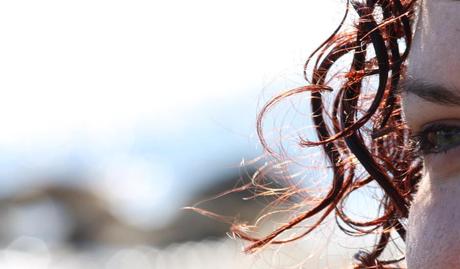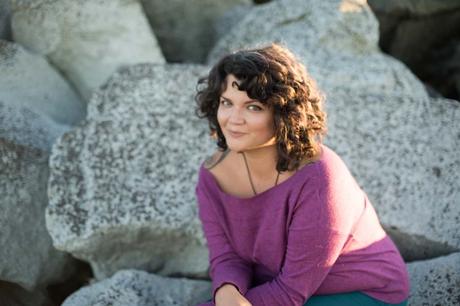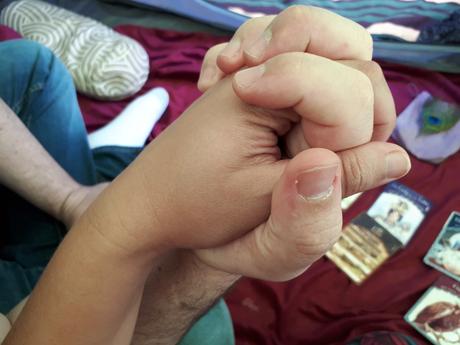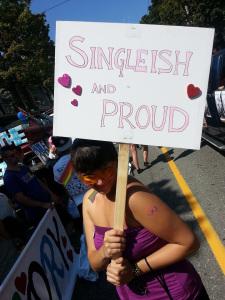
Love is not about losing freedom; it’s about sharing freedom with a partner who’s as talented a liberationist as you
~ Rob Brezsny’s Free Will Astrology
This post has been hard for me to write. Indeed, it’s been hard for me to write anything for Polysingleish of late — a combination of focusing my writing energy elsewhere, and also feeling like I didn’t have more to contribute here.
I started this blog because I didn’t have anyone to guide me when I began my journey in consensual non-monogamy. There was no guide for being polyamorous while in a primary relationship with one’s own self.
Naturally, I stumbled. I messed up. I slowly figured out (sometimes through trial and error) what it meant to be polyamorous without a primary and without being on the relationship escalator.
This blog has been around for over 8 years now— and over the course of those 8 years, my words have landed with thousands of other folks who have been exploring relationships in a similar way. It has been an incredible honor, and so very humbling to receive feedback — from both friends and strangers alike — who say I’ve articulated something that they’ve always felt but thought they were alone in their experience.
I want to stay in integrity with all of you who have read and followed this blog through the years, and offer you a reflective summary of what this journey has been, and share with you the important ways my relationship landscape has shifted.
“I’m in a primary relationship with my self and having an orgy with the universe.”
Before I had the language to define myself as Solo Polyamorous, this was how I would explain myself and my relationship desires to others. In 2012 — as I transitioned from living in a quiet, hippy-centric community on coastal British Columbia into the busy, poly-friendly city of Vancouver — I began blossoming into my Self in a way I never had before.
I’d married in my early 20s, and had so little dating experience prior to that. My marriage had been characterised by accommodation and compromise (mostly on my part) which I grew to resent. Through 7 years of marriage I lost touch with my own self, with the things that brought me joy, and the sense of play that had lifted me out of depression in my teens. Being a foreigner to Canada, introverted, and socially awkward, I had struggled to make friendships with people I shared values with. I had something of a community that helped me patch up a hole in my social fabric, but it didn’t totally fit who I was or who I aspired to grow into being.

Ending my marriage marked a new chapter, a coming back to my own self, and the possibilities of being able to explore and embody all the aspects of myself I’d kept locked away — through a childhood with a narcissistic, emotionally incestous and co-dependant homophobic mother, and through seven years of compromising my needs and dissocating from my desires within my marriage. I’d always dreamt of having multiple partners (so much so, it was a feature in my make believe stories as a kid). I knew I wanted to explore my sexuality with women. I had desires to unlock the kinkster within me. I yearned for connections that felt transcendental whilst simultaneously supportive, nourishing, and most of all where I could be fully myself.
My entry into the world of polyamory was bumpy. After early experiences of falling back into the temptations of Disney fantasies of romance, and feeling confounded by what was then a very couple-centric environment within the Vancouver Polyamory community (where almost everyone asked me if I had a primary partner), I said fuck it, I’m my OWN primary partner.
I started engaging with myself based on that: taking my self out on dates, doing things for my Self that I had longed for a partner to do, etc. This was such a radical idea in my mind. And my goodness, it was exciting. My commitment was to be firmly polysingleish for two years, and then re-assess.
I had many intense experiences during those two years. Looking back at it now, I see the younger me who was struggling: struggling with the loss of her relationship with her mother, struggling (still) to find a community who felt in alignment with her values, struggling to make a living in a city where the cost of living was twice what she’d been used to. That younger me took a long time to feel at ease in her relationships, but she had some incredible learning experiences along the way.
I remember the first time a partner asked for my consent for something sexual. I’d never been asked about my consent before. I remember nervously dating women for the first time. I remember the feeling of parts of my mind I’d never used before awakening, and the excitement that kept me up till 4am writing blog posts about my experiences.
I also remember when I felt things were not quite right. The overwhelm of attention that the ‘shiny new thing’ (as one partner referred to me) in a community receives. The fawn-responses that I gave to that attention because I didn’t know how else to engage with it, and so dearly did I want to belong in this polyamorous community that I was fearful of putting up boundaries, especially when it was community leaders who were taking an interest in me.
My own Monogamy Hangover would take over more than once.
In 2014, when that time to re-assess came along, I was in a space in my life where I felt so empowered. I had loving partners, I had incredible friendships, I was growing community through the Solo Polyamory group, and I was feeling seen, heard, and understood at a deep level for the first time in my life. I re-committed to remaining Solo, whilst diving in to loving, long term partnerships. At one point I had three incredible concurrent relationships. Between these three partnerships in my life, I felt like I’d found something of a center to my life as a solo polyamorist. I felt confident in my sexuality, and in my Self. But shortly thereafter, I went through a series of experiences that left me overwhelmed, unable to cope, and struggling.
Dancing with Demons: Tackling Trauma
If you’ve never experienced trauma, then please consider yourself fortunate and privileged. Relational trauma is one of the hardest of all: human beings are relational creatures who need connection (albeit in differing degrees) as part of their physical and mental health. When you’ve had the experience of harm coming from an intimate connection, it does a number on your ability to trust and feel safe in future connections.
As time rolled on — after being bullied by a former partner, stalked by one metamor, assaulted by another, screamed at in public spaces repeatedly by yet another meta, and feeling the withdrawal from partners who didn’t know how to engage with my resulting trauma — my enthusiasm for exploring new intimate connections began to dim.
I shifted my focus. Embracing the principles of Relationship Anarchy that I had already found so much resonance with, I began focussing on my platonic relationships as being the primary source of security and stability in my life. In my journey of recovery from trauma, it proved invaluable to nurture my friendships and community connections as the web through which my safety needs could be met. Along with growing a stronger community, I began going to therapy, and gradually felt myself regain the confidence to step back into intimate relationships — albeit much more mindfully than before, and with a craving for more simplicity and less drama.
One of the most important pieces of the journey of this past decade has been an unrelenting self-questioning. Why? My inquisitive mind has asked why of everything: of monogamy, of polyamory, of polynormativity, of solo polyamory, of sex, swinging, kink, everything. I ask myself why in my own relationships. Why am I drawn to this person? Do I feel comfortable with them because they are familiar, and does familiar mean healthy? Is my nervous system truly at ease with this partner, and if not, why not?
I often follow up with another question: what else is possible? And it is the pondering of this question over the past few years that has led my inner landscape and understanding of my needs and desires to shift.

For the past four years I’ve taught classes on the Monogamy Hangover and run workshops on how to disentangle from the trappings of patriarchal monogamy. I’ve come to see that the Monogamy Hangover is all about the ways we seek out safety, security, and stability: it’s not the only strategy that can offer that to us, but it’s the one many of us are most familiar with, and so, we will keep returning to it until we find a BETTER strategy, one that makes the Monogamy Hangover obsolete. Every time I teach this, I find myself sitting down to question what aspects of the unconscious story and programming show up in my world still.
As I write this, I’m 38 years old, and the shifts in my life over the past decade have been profound. The lessons in autonomy, agency, and independence that Solo Polyamory have taught me have assisted me in finding my own radical path in life, and have supported me as I step into being the bohemian and rebel I have always aspired to be. I learned how to be secure and loving with my own company, and have done so much healing for my own soul.
But along the way, I found something was missing for me: a grounded and secure place to come home to, emotionally.
For all the incredible partners I have had, I never found my desire for an emotional home was fully reciprocated. For some, they didn’t have the capacity to meet me with what I was desiring in our relationship. For others, they had already found that with someone else, and struggled to realize that their polyamory was more about sexual non monogamy than it was about emotional non monogamy.
I also began to realize that the ways I had pursued my sexual freedom had left me with deep wounds, and as much as I had been able to heal and integrate that past, I was now holding back in relationships because I didn’t want to re-awaken sexual traumas, nor did I want to slip back into a space where I was traumatised through erotic experiences. The slutty singleish saga of my early 30s had lost its deep appeal, and I was struggling to enjoy even my solo polyamorous connections, which began to feel either too brief, too shallow, or too far away.
I was stuck, repeating the same pattern and expecting different results.
I returned to critical examination of my relationship desires and actions, digging deep into the questions of: what do I want, why do I want it, and where do I want to be in 5-10 years?
When I first asked myself those questions five years ago, I was clear: I wanted to live in a home with good friends, and enjoy loving relationships with multiple partners. Well, I got there. And, I wasn’t happy with it. I was agitated, anxious, stressed. I’d done all this healing work on myself, and about relationships, and yet something was missing.
Much to my surprise, I found a longing awake in me for something different than the Solo Polyamory path I’d been pursuing, and for two years I’ve held that longing gently in my awareness, allowing myself to be curious about it.
What would it mean to let go of this relationship path that has become so interwoven with my personal identity? What aspects would I want to maintain, and what specifically was it about SoPo that hadn’t been serving me in my journey to joyful relating?
The possibility of a life-partner, an anchor partnership based on co-creation and commitment to mutual healing work, has always been present in my mind. Indeed, in one old blog post I wrote that such a partnership might be the only thing that could pull me into a more nested dynamic, and away from my solo-ness.
And then, last year, in the midst of the chaos and uncertainty of the COVID pandemic, as social anchors were being challenged by politics and conspiracy theorists, and right when I had realised the changes I wanted to make in my life might have to wait, someone came into my relationship landscape with whom I started to experience a connection that lit up my heart in a way I’d never experienced before.
He and I met long ago. We felt the connection and rapport, but were in such different journeys at that time, processing through our own relational traumas, and moving to areas that were geographically further away. But, we stayed in touch. And, during the course of the pandemic, our daily conversations turned to phone calls, our phone calls turned to video chats, and our video chats turned into well-planned, COVID-safe dates in real life.
Something began happening. Something we both noticed. It wasn’t a Disney romance. It wasn’t a Hallmark movie. But it was deep, it was profound, it was compelling, it was a good kind of scary — and as we pushed it and tested the connection in every which way we could think of, we found ourselves growing closer and more profoundly loving and appreciative of one another.

Does he meet me in all aspects of my life? No, not at all. But he meets me in some of the most important aspects of my life, including in aspects I have never felt met before. We share a bond of experience, values, and vision, and it has been profoundly healing for me to find this with someone, and I cannot say enough about how important that became for me in the past few years. His care, his compassion, his deep understanding of the way drama in polyamory can leave one with tender wounds, and his capacity to hold space for all of the complexity that is me has brought me tears of joy, and softened my heart that had been growing hard. Most amazingly, he says I do the same for him. When we are together, we can be tender, we can be vulnerable, and we can hold one another with boundless love and support when we go to the scary places of our psyches. We show up with one another as secure, committed, and present to all the ups and downs in our individual lives.
Our connection has helped me be more gentle with myself, and by extension, step into a more loving self-relationship too.
And while he’s probably not going to join me for ecstatic dance, and I’m not likely to tag along to too many doom metal shows with him, the ways we meet are delightful, nourishing, and nurture both of us in ways we’ve been sorely missing in our respective relationship landscapes.
In this relationship, I feel nourished in a way I didn’t even know I had been missing.
Finding ‘The One’

Did I find “the one”? Oh goodness, I found ‘the one’ long ago: she’s me! But what I’ve found with this human is a partnership that allows me to feel a little less alone in my self-primaryship. Nothing about this relationship detracts from that self relationship, and if anything, the love and care I experience in this connection has brought me back into a stronger, healthier relationship with my Self.
This isn’t a monogamous, escalator romance. This isn’t the ending of a journey or the arrival at some kind of ‘inevitable’ dyadic partnership destination. This is a bohemian, radical upending of mono-normative, hetero-normative, and yes, even poly-normative thinking.
It is an anchoring, life-partnership that extends through all parts of my landscape: emotional, erotic, social, and practical. While our respective journeys to arrive here together have been similar yet different, we are now consciously weaving our life paths together. I revel in being able to build a healthy and integrated relationship with his other loved ones. I get to experience moving through my anxieties and fears and other brain demons about our relationship while being seen, heard, and supported by him. I have daydreams of domesticity, the stability of sharing a home where we can welcome our partners, lovers, and community with grace and ease, and share loving kindness with them as much as we share with one another. This is the start of a new chapter, one that is already confronting me with all kinds of new challenges, and I relish that.
As a Relationship Anarchist I’ve held that labels should be descriptive rather than prescriptive. And the path I’m now on no longer resembles solo polyamory. I’m not just looking to move in with a partner for practical purposes. I am absolutely, consciously, creating an interweaving life partnership with someone, a partnership we both hope will continue to be nourishing for many years to come.
But I’m not leaving behind that primary-ship with my Self. I’m not letting go of the agency that says ‘I’m allowed to change my mind, and live on my own terms.’ Indeed, if not for my journey as a solo polyamorist, I don’t think that I would have arrived at this place, and I don’t think I’d have the same understanding of just what it means to make bold changes to preserve one’s own right to do what you need to do for the greater wellbeing of your soul.
I don’t think this is an inevitable path for people practicing Solo Polyamory. And I worry that, having had such a place in the public eye of solo polyamory, the changes in my relationship landscape might be seen to invalidate the solo polyamorist’s path. So let me be clear: there is profound healing work that needs to be done outside of enmeshed relationship. We are so many generations thick in trauma from enforced monogamy and all the trappings it brings (including gendered oppression, and more) that I do believe every individual would benefit from spending some of their time in the realms of Solo Polyamory. What might, perhaps, be inevitable, is that each person in their journey may need to find their own way of balancing the tension between self-intimacy and intimacy with others, as a crucial piece of finding secure attachment and somatic ease within themselves.
Almost ten years since I started this blog, and the conversation in polyamory has shifted. We’re just starting to undo the couple-centric and monogamy hangover thinking that has directed most consensual non-monogamy till now. We’re starting to talk about having a trauma-informed approach to polyamory. And, we’re beginning to collectively realize the real significance of supporting a healthy relationship with one’s self as being paramount.
I take pride in having played a role in that shift. And even though my own relationship style has changed through the years, I maintain that primary-with-my-self attitude, and work to cultivate self-intimacy daily.
This is the last post I intend to make here on Polysingleish.
It has been quite the ride, and I am grateful for everyone who’s taken the time to witness it.
But my own personal journey is not over. Rather, it’s a new adventure that is beginning. One where I get to explore just how profound this self love can become when building conscious and transformative relationships with others. You can keep following my work over at Radical Relating, via my mailing list, and also on Facebook and Instagram. And, I promise you I’ll keep doing everything I can to offer validation to, and create spaces for those solo and singleish folks within the polyamorous communities, and within the world at large.
With all my love,

“Remember that self love is also revolutionary and world-changing. We cannot fight for others when we are fighting a war inside ourselves. Compassion is reflexive, a power that we first bestow on ourselves, and then give away through our actions — to people, to our planet. When we recognize that truth, that is when we let love become our legacy”
~Amanda Gorman.

